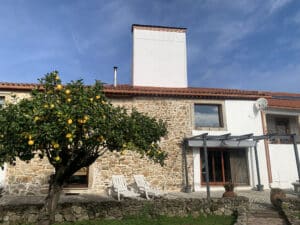Almost 1,000 “priority parishes” identified for inspections, 14 in Algarve
The government has extended the deadline for landowners to clear their land ahead of the summer wildfire season by another month, until May 31, identifying 988 ‘priority parishes’ in which so-called “fuel management work” will be inspected.
According to a recent order published in state gazette Diário da República, the extension is justified ‘considering the weather conditions that have occurred, with persistent precipitation and high water content in the soil’ which have limited periods available for carrying out fuel management work, not to mention leaving land far less vulnerable than during periods of drought.
In a second order, published last week, regarding priority parishes for inspection purposes, 988 were ‘identified (34% of the total number), covering 2,871,924 ha [hectares] of total area (32% of the surface area of mainland Portugal) and encompassing 1,988,232 ha of forest spaces (37% of its total area)’.
These inspections will be carried out between June 1 and 30.
According to the order, Bragança is the district with almost two hundred priority parishes (or unions of parishes), followed by Guarda and Viseu, with a 150 each, Vila Real, with over 80, and then Coimbra, with more than 70, while Beja and Setúbal have just four priority parishes, Lisbon five), Portalegre 12) and Faro 14, namely Aljezur, Bordeira in borough of Aljezur; Ameixial, Salir in Loulé; Alferce, Marmelete, Monchique in borough of Monchique; São Brás de Alportel; São Marcos de Serra in Silves, Cachopo, Santa Catarina Fontes do Bispo in Tavira; Monte Gordo and Vila Real de Santo António; Vila do Bispo and Raposeira).
As in previous years, inspections will focus on ‘fuel management strips’ ensuring that homes and properties have a 50 metres wide berth from overhanging trees/ heavy foliage. Authorities will be most attentive to ‘built up areas/ hotel establishments, camping and caravan parks, leisure and recreational infrastructures, and parks, business and industrial areas, petrol stations, logistics platforms and landfills, as well as ensuring the existence of fuel management strips near roads and railways, electricity transmission and distribution lines, gas and oil product transport lines, electricity and gas production and storage facilities, and infrastructures supporting Portugal’s Integrated Emergency and Security Network System (SIRESP).
source: SIC Notícias/ Diário da República



















